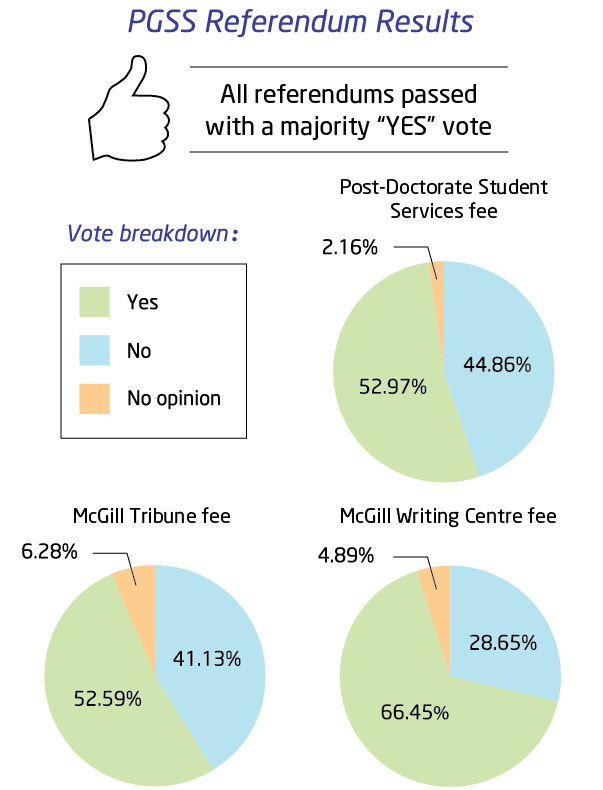Members of the Post-Graduate Students’ Society (PGSS) have approved three new fees as a result of the PGSS Autumn 2013 Referendum By-Election.
Beginning next semester, graduate students will pay a $1.50 per semester fee to the McGill Writing Centre and a $0.75 per semester fee for to the McGill Tribune. In addition, postdoctoral fellows voted in support of a non-optoutable $136.44 per semester fee that allows them access to various student services.
The non-optoutable fee for the McGill Writing Centre will allow graduate students to use the university-run service, which assists students in refining academic and professional writing skills.
“PGSS asked for a report on usage and satisfaction [of the Writing Centre] several months ago,” Mooney said. “We found that about one third of the users are post-graduate students and the satisfaction report indicated seemingly unanimous approval for the quality and usefulness of the services provided.”
The new McGill Tribune fee means that graduate students will pay a non-optoutable fee of $0.75 in the 2014 Winter and Fall semesters, with the option of renewing the fee in Winter 2015. Elisa Muyl, chair of the Tribune Publication Society’s Board of Directors, emphasized the importance of graduate students providing financial support to the newspaper.
“It’s important for McGill as a community to have a newspaper that covers it in its entirety, to have as many voices as possible that represent it in as many different possible ways,” Muyl said.
The third new non-optoutable fee provides postdoctoral fellows with access to student services including Mental Health Services, Chaplaincy Services, and Career Planning Services.
Postdoctoral fellows are individuals who have completed their doctoral studies but continue research in their field under a supervisor or principal investigator. Currently, the university considers postdoctoral fellows to be staff, although the Quebec Government classifies them as students, which leaves them with limited access to the benefits of either classification.
According to PGSS Secretary-General Jonathan Mooney, the new fee will help integrate postdoctoral fellows into the McGill community and allow them access to more of the services offered to other students.
“I think this is one way of better integrating postdocs at McGill and meeting their unique needs.” Mooney said. “The Career and Placement Office will now develop programming targeted at postdocs [and] postdocs will all be eligible to use health services, Mental Health Services, [and] Counseling Services.”
12.6 per cent of McGill’s 8,500 graduate students voted in the referendum—a high number for a by-election according to Chief Returning Officer Colby Briggs. In addition, 26.5 per cent of postdoctoral fellows voted.
“The goal is not necessarily turnout in itself, but member engagement,” Briggs said. “From the feedback I have received from members, the grand majority of students that we represent were well informed of the referendum options and its effects [….] The turnout of postdoctoral fellows is really quite striking, […] especially for a group that is often somewhat disengaged with student affairs due to their status between students and employees.”
Emma Vincent, president of the Association of Postdoctoral Fellows, said she hopes the referendum results will lead to positive changes for post-doctoral fellows at McGill.
“This will bring the postdoc community closer together, increase the visibility of the community at McGill, and initiate provision for postdoc-specific needs,” she said. “The next steps for the Association of Postdoctoral Fellows will be to work with those who provide the services to ensure that postdocs will be catered for to the best of their abilities.”







